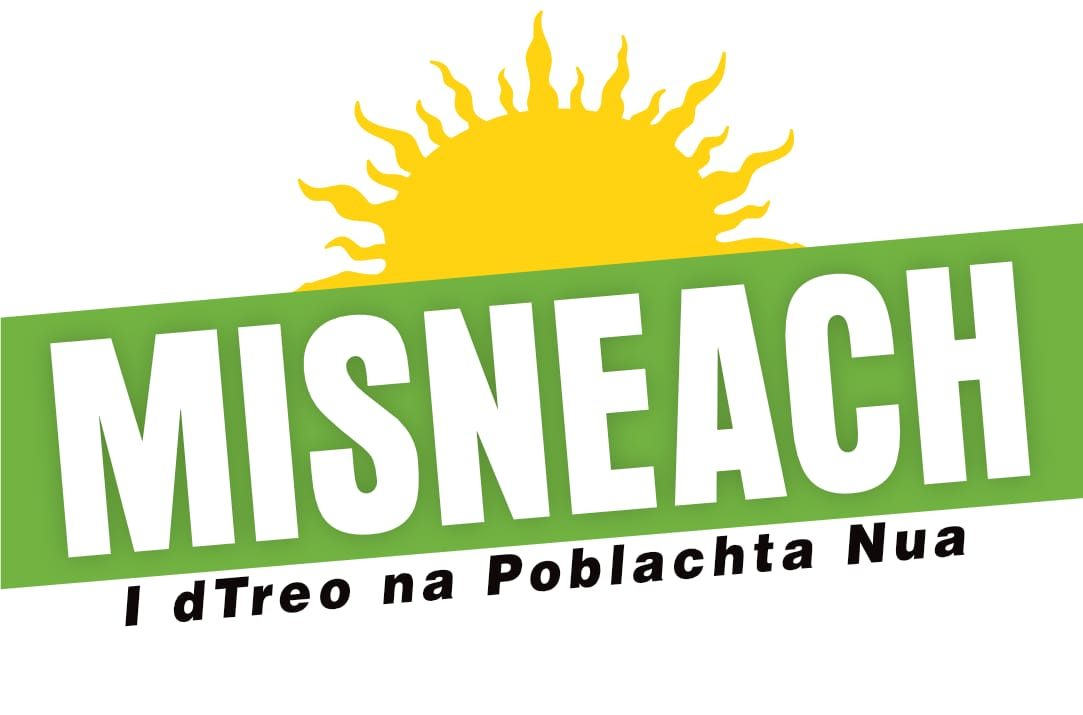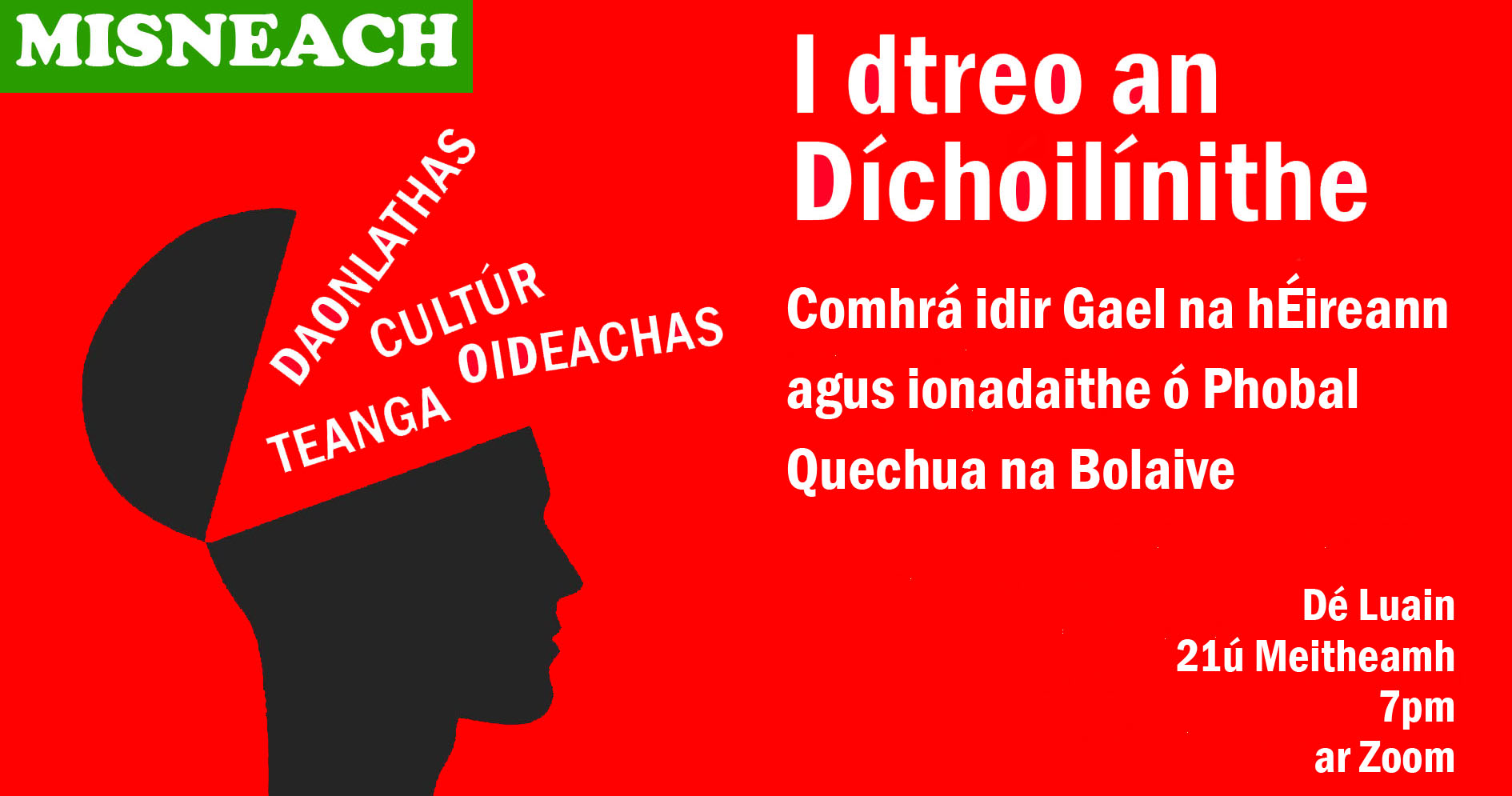[Béarla thíos/English below]
Sa chomhrá iontach suimiúil agus tairbhiúil seo, an chéad cheann dá shórt, go bhfios dúinn, beidh gníomhaithe ó Éirinn agus ón mBolaiv ag plé an díchoilínithe.
Cé go bhfuil trí cheathrú d’Éire “díchoilínithe”, mar dhea, ní minic a phléitear tionchar rianta síceolaíochta an choilíneachais – na rudaí ar bhaist Frantz Fanon “germs of rot” orthu. Sna Sé Chontae, tá na constaicí a bhfuil an coilíneachas a chur i mbealach na Gaeilge agus an próisis díchoilínithe níos soiléire.
Beidh Feargal Mac Ionnrachtaigh, údar an leabhair Language, Resistance and Revival, a bpléann an díchoilíniú ina phobal féin i mBéal Feirste, agus Kerron Ó Luain, Oifigeach Poiblíochta Misneach, ag caitheamh súil ar chás na hÉireann.
Amhail na Gaeil, is pobal mionlaithe é an pobal Quechua na Bolaive. Ach is pobal í atá scaipthe amach thar teorainn tíortha eile i Meiriceá Theas chomh maith.
Beidh José Antonio Rocha Torrico, Uachtarán an Acadaimh Réigiúnaigh don Teanga Quechua sa mBolaiv, agus ionadaithe eile ón phobal linn chun a gcuid taithí agus saineolas ar chás na teanga úd a roinnt linn.
Samhlaítear an comhrá seo mar mhalartú tuairimí, straitéisí agus mar thógáil dlúthpháirtíochta.
Cé go bhfuil “saoirse” anois ag formhór na dtíortha a bhí greim ag stáit choilíneach orthu san am a chuaigh thart, cén fáth a mbíonn a ladar á chur ag lucht na himpireachta isteach i gcúrsaí cumhachta na dtíortha sin go fóill?
Céard é an díchoilíniú go díreach and conas gur féidir leis dul in adharca leis na stáit impiriúla? Ní hé díreach nithe fisiciúla amhail deilbh lucht na himpireachta a bhaint aníos, curaclam ollscoile a athrú, nó na boscaí poist a phéinteáil glas in áit na deirge. Dealraíonn sé go bhfuil cur chuige níos doimhne i gceist – ceann a bhaineann leis an intinn, an teanga, leis an oideachas, an daonlathas agus le cultúr laethúil na cosmhuintire.
Beidh seo, agus tuilleadh lena hais, á chíoradh sa chaint uathúil seo.
Beidh formhór na cainte i mBéarla agus beidh cuid de i nGaeilge.
Is ar Zoom a bheas an chaint – 7pm, Dé Luain, 21ú Meitheamh.
Tá cuireadh ort chuig cruinniú Zoom: Luan an 21ú Meitheamh 2021, 19:00 (Baile Átha Cliath)
Cláraigh roimh ré. Ina dhiaidh sin, gheobhaidh tú r-phost deimhnithe ina mbeidh an t-eolas maidir le theacht isteach sa chruinniú.
https://us02web.zoom.us/meeting/register/tZYrcOytqDktHNNE6aigpY6JwCUUmHhZnpve
———————–
In this interesting and necessary conversation, the first of its sort that we’re aware of, activists from Ireland and Bolivia will discuss decolonisation.
Although three quarters of Ireland is, some would say, “decolonised”, the long-term impact of colonialism on the state is hardly ever discussed – that which Frantz Fanon termed the “germs of rot” left behind by imperialism. In the Six Counties, the obstacles facing the growth of the Irish language and any process of decolonisation are more stark.
Feargal Mac Ionnrachtaigh, author of Language, Resistance and Revival, which discusses decolonisation in his own Belfast community, and Kerron Ó Luain, Publicity Officer of Misneach, will elucidate the Irish situation.
Like Irish speakers, the Quechua people of Bolivia are a minoritized community. But they are a community that is spread across a number of states in South America.
We will be joined by José Antonio Rocha Torrico, President of the Regional Academy for the Quechua Language, along with other representatives from the language community, to hear their experience and learn from their expertise in trying to save their own language.
This conversation is framed as an exchange of ideas, strategies and as a means of building international solidarity.
Although the majority of countries who suffered under the colonial states of the past have, ostensibly, achieved “freedom”, why do the imperial states continue to interfere in their affairs?
What is decolonisation exactly and how can it challenge this continued interference? Decolonisation is not simply removing the statues of the colonisers, changing university curricula or painting post boxes green instead of red. It seems to us that a deeper interpretation needs to be put centre stage – one that focuses on the mind, on language, on education, on democracy and on the daily culture of ordinary people.
This, among other questions, will be discussed in this unique talk.
The talk will mostly be in English, with some of it in Irish.
It will be broadcast on Zoom – 7pm, Monday, 21st June.
You are invited to a Zoom meeting: Monday 21st June 2021 19:00 (Dublin)
Register in advance. After registering, you will receive a confirmation email containing information about joining the meeting.
https://us02web.zoom.us/meeting/register/tZYrcOytqDktHNNE6aigpY6JwCUUmHhZnpve


